Children need discipline, so we’ve been told. So why do so many of us have a hard time setting boundaries and enforcing limits?
You would think that after the first three kids, I would have enough experience and practice to immediately know how to handle infractions, strong-willed stubbornness, defiance, back talk, whining, and more.
But I am still a work-in-progress-mom, and it’s taken me many years to catch up to where I need to be!
I know that no-discipline parenting (or inconsistent discipline, in my case) is the type that’s destined to fail my children, so even though it’s taken me a long time, I’m making some positive changes in the right direction.

This post likely contains affiliate links. Please see our disclosure for more info.
While some parenting tasks come easy to me, setting boundaries hasn’t always been my strongest skill, as I’ve learned over time.
And because of my hesitation, of course, I’ve discovered WHY discipline is so important for children. Funny how that works!
Hear me out: I always knew that child-training was a part of the parenting thing.
I mean, I was a kid once and I knew what it was like to receive discipline. I vaguely remembered reading about discipline in the Bible and how important it was to reign in your children while they’re young.
But here’s the thing. Honestly, I didn’t think much about how I would discipline my kids or how important it really was, until the kids were already at the stage of needing to be disciplined.
Read Next: 5 Qualities of Good Parents: It’s Really as Simple as This
I don’t even remember one conversation I had with my husband before we had kids on what we thought about the subject and how we would approach it.
Parenting hindsight is ALWAYS 20/20
It seems that when you’re pregnant, hormones and mothering instincts take over in full force, and you’re basically wrapped up in nursery decor, thoughts of sweet baby snuggles and hoarding tiny diapers and outfits for your impending arrival.
And these warm fuzzies carry over for quite some time until after the baby is born.
You’re really not thinking, ‘Wow, this little baby is so precious and innocent, but before I know it they’ll be a toddler eating out of the trashcan and throwing temper tantrums — I better have a plan now!’
At least, that never entered my mind. But it should have!
And it turns out that I’m not the only one. In an ironic twist of fate, the lady who never gave much thought to child-training techniques actually ended up teaching parenting classes, and guess what the main topic we discuss is? You guessed it, discipline!
One thing that I’ve learned is that most parents are like me- they either didn’t have a plan to begin with and are basically winging it; or they had a plan in mind but it all went down the toilet once they actually had a kid possessing any amount of willpower (which would be all of them).
Why we falter in the discipline department
While we all might not agree on the exact methods for molding our children’s behavior and attitudes toward the world, I think it’s really important that we understand some basic concepts of appropriate discipline early on.
Ideally, this should be something we put some serious thought into before the baby comes into the world.
But since a lot of us don’t have that foresight, I want to point out some common discipline errors that I see and I’ve made myself.
And then maybe you’ll understand why I’ve been motivated to being more committed to disciplining my kids in a different and better way over the last few years.
#1. The First Child is the Center of My World Syndrome
It happens to the best of us. We have these lofty ideas about our firstborn – what they’ll look like, what we’ll teach them and how they’ll never do this-or-that.
We expect great things from them; they are, after all, the firstborn: the coveted, top-of-the-food-chain, break-in-the-parents, destined-for-greatness, type-A-in-the-making FIRST CHILD.
We, as first-time parents, are certain that just because we produced offspring, they will be different from all the other inferior offspring running amok in the world — they will break the mold and, consequently, never need any discipline.
About the time they start throwing their food from their highchair, we begin to suspect that maybe we’re slightly wrong.
And then they learn the word “no” and start to use it in earnest, and we wonder if maybe this child really is related to us. (Terrible twos, anyone?)

We quietly start to question little Tommy’s pre-planned future as concurrent President of NASA and the American Medical Association.
But from my observation, the reality of our lack of discipline for the first child doesn’t really hit home until, you guessed it, the SECOND child arrives.
Why do you think it takes child #2 to begin to make us realize the importance of discipline?
Simple: because when it’s not been practiced with child #1, it makes for a crazy household once a new, fragile, needy, wailing bundle of joy is placed into our arms and baby #1 is no longer King of the Castle (but no one told him otherwise).
The smart moms are quick to start making some corrections and learning from these mistakes with the firstborn, but some of us take a little longer.
#2. The Dreaded “D” Word
Another reason I think we often fall short with providing good discipline is because we don’t really understand what the purpose or meaning of it really is – or what God intends for it to be. Most people think “discipline” is synonymous with “punishment”, and usually delivered in a harsh form.
I would venture to say that a good majority of people I know with “discipline hesitation” had harsh, authoritarian types of parents and they don’t want to be that type of parent to their kids.
They recognize what the “wrong” approach is, but they fail to realize there’s any alternative, so they either discipline half-heartedly or not at all.
But punishment, although necessary, is not the end goal, nor should it be harsh, rude, reactive, or ill-planned.
In fact, if it does fall into those categories, the only thing you will be “teaching” your child is to be harsh, rude, reactive and so forth.
What they really need is a strong, loving parent willing to guide them away from destructive choices and towards choices that are good, right and true.
This is done, in part, with appropriate punishments for negative behaviors and healthy reinforcement for positive behaviors.
But underlying it all needs to be the solid foundation of relationship. Our positive relationship with our kids is what makes all the difference in making these lessons actually stick.
And over time, and with love, children will naturally learn to make these good decisions without our help.
Because, of course, we won’t always be there to repeatedly remind them how they should behave every step of the way. (Eureka moment here!)
From a Biblical perspective, we have the opportunity to train our children and instill good character and behavior at an early age — and really for a short period in their lives, so it’s a time-sensitive task!

Related article: How to Raise Happy, Motivated Kids
Yes, this training is going to require some effort and creativity on our part, but the rewards will be great if we do it well.
#3. Lack of Boundaries, Zero Consistency
Whatever discipline method we use, it should involve two things that appear to be near the top of the “Most Important Concepts of All” list: Boundaries and Consistency.

Lack of boundaries, simply put, leads to chaos.
Kids need to know where the limits are and that someone loves them enough to enforce them. There is safety and freedom within boundaries.
We are all subject to boundaries in life, and we are all subject to someone’s authority and ultimately, to God.
When we are lax in enforcing the boundaries we’ve put into place with appropriate, real-world consequences, our authority will be undermined and it’s going to be that much harder every time thereafter to attempt to enforce those boundaries. (Trust me on this one!)
Even so, it must be done, so the sooner we decide to be boundary-setters and enforcers (in a loving way), the better.
So: Boundaries, Consistency, Boundaries, Consistency — they go hand in hand. Just do it.
Related article: Teaching Kids Respect in a Positive Way
Admittedly for me, this was a slow progression, realizing that I needed to work harder on disciplining my kids – particularly after my 4th baby came along. It was never so necessary as it was then, let me tell you!
Yes, I had been providing a form of discipline all along, but I wasn’t as consistent as I needed to be, it wasn’t as appropriately loving as it should be.
I knew I needed to dig my heels in and parent with intention, because the stakes are so high here.
My kids’ futures, their relationships, and my sanity are just a few of the reasons I wanted to do better, once I knew better.
I’m still a LOOOONG way from where I want to be in this regard, but I love how God has a sense of humor and has used my own teaching experiences to teach ME about what changes I need to make — for the good of my children, myself and others around us.
Slowly, we’re all starting to reap the benefits of these changes.
And as I’m reminded of my responsibilities as a parent I’m also noticing something else in my children: the reflection of a loving Creator who cares enough to guide us all.
Related Products:

You Might Also Like:
Addressing “Talking Back”: A Biblical Approach for Parents
Are you Intentionally Spending Time With Family or Just Marking Time?
50 Questions to Ask Your Kids to Grow Your Relationship – and Their Faith
A Fun Idea for Teaching Values to Young Kids – Without Lecturing or Nagging
How to Get Kids to Listen Without Yelling – and End the Power Struggles

originally published 6/23/18 and last updated 2/14/20.
This is a great article! And your honesty about needing to work on your discipline was very comforting! Thank you!
Thanks Ann for the feedback 🙂
Great article! Kids need boundaries and want us to enforce them (whether they realize it or not). It is so critical for kids to learn to respect authority, since this will benefit them throughout their lifetime. Thanks for sharing!
Thanks Nicole! I agree!
Great advice! I have to be so intentional about these or the next thing I know it’s total chaos around here, and I’m scratching my head like… what just happened to our perfect world. #1 I’ll go ahead and raise my hand, so guilty. So trying to undo some of what was done. Live and learn… Thanks for sharing your wisdom.
Oh goodness, it’s a struggle isn’t it?! Knowing what to do and actually implementing/ reinforcing discipline are two different things. We’re in this together! Thanks for stopping by. 🙂